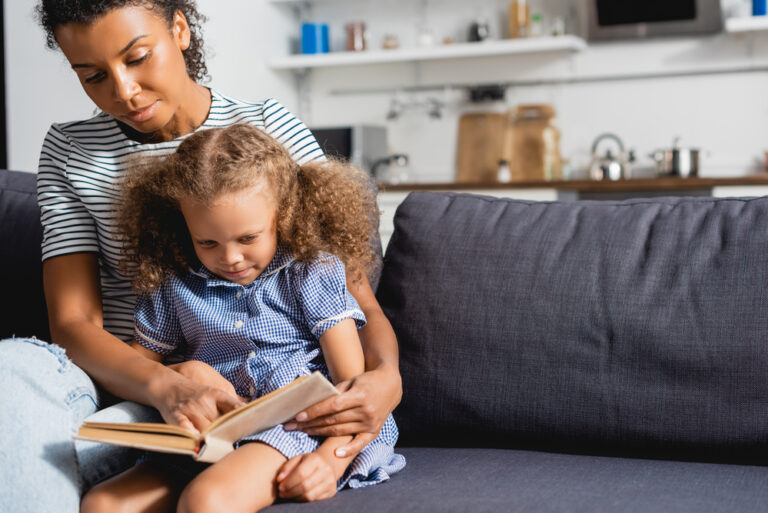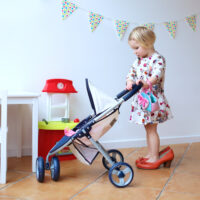Reading to your children helps them academically, emotionally, and developmentally. As a child, I was read to often, and even now, I love to read for fun and share that love of reading with my children. Based on personal experience, my mom who was a librarian and teacher, plus the findings from major studies, I broke down the wonderful benefits of reading to children and included tips to help literacy skills.
10 Benefits of Reading Aloud to Your Kids
Quality Time
Time spent reading to your child is time you’re spending together. Quality time is important for creating and maintaining a healthy bond. Even if you are an extra-busy parent, making it a priority to read to your child is still crucial. You may lean towards reading to your oldest child the most (if you have multiples). While this is common, try to spend an equal amount of time with all children.
I still remember many of the books my parents read to me as a child, and I hope I am creating fond memories with my own children for them to look back on for years to come.
Vocabulary
A 2019 study found that parents who read one picture book a day to their child can expose their child to more than 1 million more words by the start of kindergarten compared to children who are never read to. One million is a huge number!
The research states that reading to a child introduces them to a larger variety of words compared to simply conversating with a child. So even if you talk to your child all day, they can still pick up new and different vocabulary words from books that you read to them.
My mom agrees that increased vocabulary is a huge benefit, especially when you are willing to answer your child’s questions about what a word means. Children of lower socioeconomic status sometimes fall behind in vocabulary, so it is especially important to read aloud to them.
Love of Reading
If you spend quality time reading with your child, he or she may realize that reading can be an enjoyable activity. Having a good attitude about reading will help your child’s attitude about reading and improve the process of learning. Enjoying the act of reading makes it easier to be a life-long learner.
Reading Skills
If your child is too young to read, reading aloud to them will help build up their reading skills. Pointing to each word as you say it aloud helps your child create the connection that the sounds they’re hearing and the words they’re seeing work together. You will also demonstrate (and can talk about) the order in which you read text. Starting at the top of the page and moving left to right are things we take for granted; young children will need to learn the basics.
While it is helpful to point at words, don’t force your child to watch your finger point throughout the entire book. Doing so may turn the activity of reading together into a chore. Children also want to look at the pictures and take in the story itself.
Once you have a reader, they may be able to follow along with your reading without you pointing. If you are reading books above their reading level, hearing you read the text will help them learn more difficult words and more complex sentences.
Listening Skills
Very young children won’t have the attention span to listen to long books. If you start with books that fit well within their attention span, they will develop the skills and patience to sit still for longer periods of time as they get older. Being able to listen well and pay attention aids in comprehension, which is an important literacy skill.
Increased Knowledge
When kids are exposed to many books, they are exposed to many new ideas as well. Nonfiction books will teach facts, but even fiction can introduce new places, people, and ideas. My kindergartner likes a series of stories about horses right now. Through the stories, we are learning about types of horses and how to care for horses.
“The single most important activity for building the knowledge required for eventual success in reading is reading aloud to children,” states the Report on the Commission for Reading.
Emotional Skills
Reading aloud to your child is a wonderful way to introduce and talk about many different emotions. For example, as you read about each character, you can ask your child how they think the character is feeling at different points in the story. You can talk about the right and wrong ways to handle emotions. Then you can ask your child if they can relate to how each character is feeling.
My mom agrees that reading aloud to your kids helps them build empathy, as they see and relate to characters in situations they haven’t experienced themselves. They can start to understand different points of view by looking at things through another character’s eyes.
Even with nonfiction books, you may be able to include some empathy or emotional skills. In any books or articles with people, you can talk about the people’s feelings. You might ask how your child feels about the subject of the book, whether it is animals, construction trucks, or something else.
Imagination
Hearing stories introduces your child to new worlds, which can inspire their own imagination and creative thinking. This can spill over into other literacy activities, like writing, and also into imaginative play. Imaginative play is important for growing minds as well.
I often hear my kids playing out a scenario that they came across in a book and expanding on it, whether it is a journey across the ocean or an adventure with knights and dragons.
Curiosity
Reading to your children can inspire them to want to learn more about a topic. As they are exposed to more ideas and topics, they may have more questions. Being curious and wanting to know more are traits that will benefit your child for life. Children’s curiosity has been found to predict academic success.
Researchers found that curiosity can even bridge the achievement gap between students of different income levels. Low-income students with high curiosity had similar scores to high-income children.
Scholastic offers some tips on how to create curious readers geared towards upper elementary children.
Low-cost Entertainment
You can keep a bored child’s mind occupied by reading aloud. If you have access to a library, you’ll find hours and hours of free entertainment for you and your child. Listening to a book being read can help make waiting easier if you are stuck in a waiting room or line and can help pass the time when you have to stay home.
Most of us want to keep our kids from having too much screen time, and reading aloud can be a more engaging way to entertain them. If you’re allowing some screentime, e-books can be a fun way to listen to various people read books aloud.
Tips for Reading to Children
In 2014, the American Academy of Pediatrics started recommending reading aloud to your child every day from birth on. But it’s never too late to get started, no matter your child’s age. Here are some tips to help you start reading aloud or to up your game in the reading department.
Choose Books that Interest Them
It’s important to select books your child will be interested in. If they are old enough to express a preference, it’s even better to let them choose at least some of the books you will be reading to them.
If you need suggestions, check out our lists:
- Best Books for 1-Year-Olds
- Best Books for 2-Year-Olds
- Best Books for 3-Year-Olds
- Best Books for 4-Year-Olds
- Best Books for 5-Year-Olds
- Best Books for 6-Year-Olds
If buying a bunch of new books is not in your budget, you can still read to your child. Make visits to the library or see if there is a Little Free Library in your neighborhood. Many libraries also offer e-books that you can check out from the comfort of home, or ask your child’s teacher for suggestions on local resources.
For more ideas, read this expert list of tips for finding the right read aloud book for your child’s age.
Add it to the Routine
We read books as part of our kids’ bedtime routines. Before they were in school all day, we’d read together throughout the day as well, but before naps and bed were our most consistent times. Reading before bed works for a lot of families as their day is winding down, and it is even recommended by the AAP.
But if that’s not the best time of day for your family, that’s OK. You could start your day off with a book before or right after breakfast. You could read to reconnect after school or work. Pick a time of day that works best for your family.
Experts suggest 30 minutes of reading or literacy activities a day for young children. Even if that seems unrealistic, starting with 10 or 15 minutes is far better than never starting at all. Maybe you can work your way up from there.
Spread Literacy Throughout the Day
You also don’t have to get 30 minutes of reading in at bedtime (or at any one point in the day). Spending a few intentional minutes on literacy activities several times a day will get the job done.
This can include singing a song together in the morning, reading the cereal box, writing with bath crayons, reading a book, etc.
Check out page 2 of Michigan State University’s tips for reading with children for a sample schedule that shows how easy it can be to reach a 30-minute goal.
Keep it Fun and Interactive
Don’t act like reading aloud is a chore. Make it something that you and your child look forward to. Jazz the stories up with different voices for each character or add in your own sound effects.
In addition, involve your children in the experience. Before reading, you could look through the pictures together and talk about what you think the story will be about. Let them ask questions in the middle of the story. Ask them questions about what they think will happen next or why a character is feeling or acting in a certain way. Let them predict the ending or come up with an alternate one.
These interactions help with your bond and their reading comprehension skills. Find more expert ideas for having conversations about read alouds.
Don’t Stop Reading Aloud
Your toddler or preschooler may go through a time when they don’t want to sit still to read. Keep trying to make it a fun activity without forcing it. Leave toddler-safe books out for them to look at on their own, and keep offering to read aloud the book of their choice.
Maybe you will think about stopping once your child can read well on their own, but many reading aloud benefits will continue to apply even after your child can read. My mom says it is still important to read to your kids who can read as well. She says the bonding and positive role-modeling continue no matter a child’s age, and an adult’s questions about what is being read will help comprehension skills.
Your child may be tired of practicing their reading when they get home from school, so listening to you read aloud in the evenings will allow them to soak in reading in another way without it being additional work.
I still read books aloud before bedtime most nights with my 10 and 8-year-olds. We take turns reading a page of chapter books. It’s fun and we still get to talk about new vocabulary that they might not stop to ask me if they were reading on their own.
For more ideas to start or improve your time reading aloud to your child, the AAP offers tips for reading to your child at specific ages from birth to preschool.
Other Ways to Build Literacy Skills
Look for Words Everywhere
You and your child will encounter words in many places beyond books. Talking about the words on everyday things, like food products or street signs, helps to increase your child’s awareness of words for reading practically.
Check out our list of ideas for building letter recognition here.
Sing Songs and Rhymes
When you recite nursery rhymes or sing songs together, you are also working on language skills. This vocabulary is probably different than what is typically said in your day-to-day conversations. You also have the opportunity to demonstrate and talk about rhyming, which helps create an awareness of sounds and how they relate.
Use Audio Books
Listening to an audio book, storytime podcast, or watching a video of someone else reading aloud will give some of the same benefits of you reading aloud to your child. So when your voice needs a break, you can let someone else read-aloud for a bit. It would be ideal if you can listen too, so that you can still have conversations to encourage comprehension and emotional learning.
We like to listen to audio books on longer car rides and my kids really enjoy them. Sometimes when someone is home sick, I find them an audio book to listen to as well instead of using screens all day.
Have Books Available
Make sure there are age-appropriate books that your child can reach on their own, even from the toddler years. Flipping through the pages is a good early literacy activity, and older children can read to themselves whenever they want.
Ask Questions to Spark Curiosity
Try to be intentional about having conversations about different topics to get them thinking. It could be something like, “Why do you think we wear shoes?” or “How did our food get to our house?” You could ask how they think something was made or why your pet exhibits certain behavior.
These questions help your child with critical thinking and it could create a desire to find out the true answer. Conversations like this can lead to doing some research together (whether online or in a book) and get them to think more about things kids usually take for granted.
Write a Book Together
Try writing a book together! Depending on your child’s age, you may write down what they dictate or direct them in writing it mostly on their own. Your child seeing themselves as a writer can drive interest in reading. Even writing a letter to send to a friend is helpful!
Find more ideas specific to your child’s age with PBS’s literacy articles.
Bottom line: Read to Your Kids
There are many benefits of reading aloud to your children, and you don’t need to be an expert to apply them. Round up a few books, whether from the bookstore or the library, and get started building a happier, smarter kid. Plus, you’ll be making wonderful memories together in the process!






